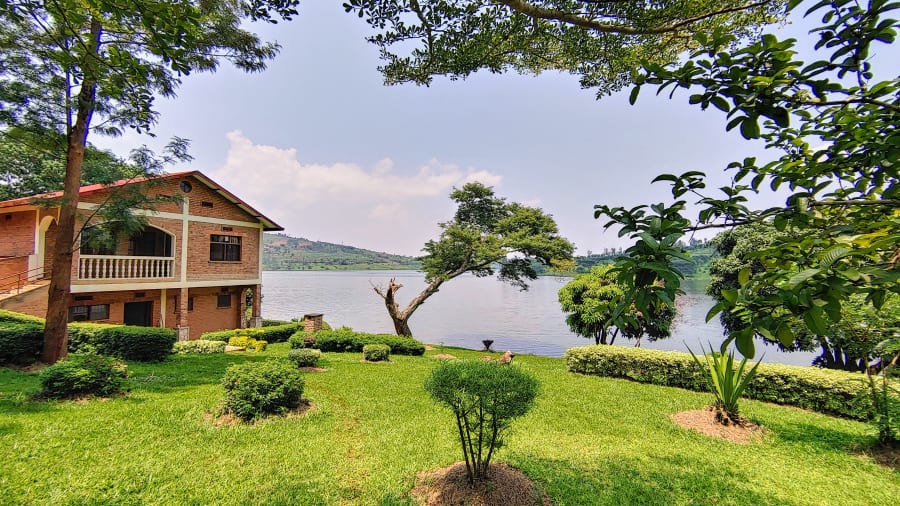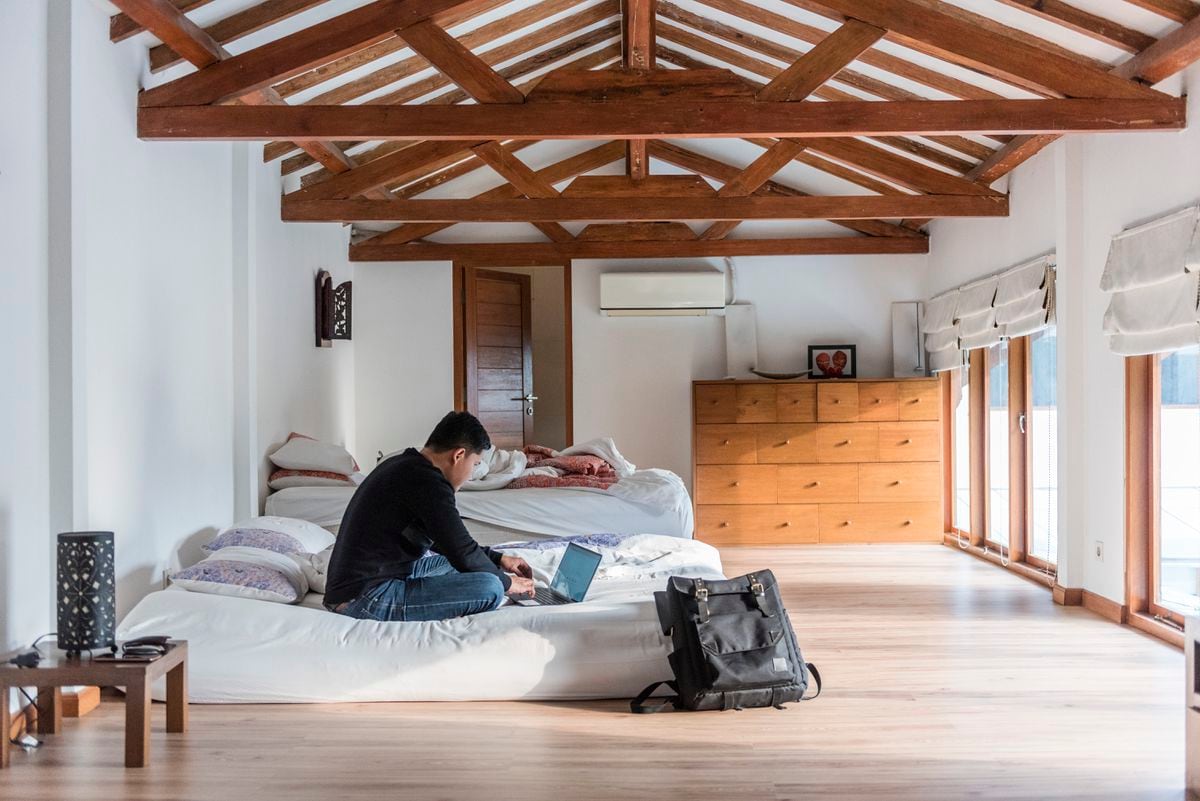(CNN) --
Since its launch in 2008, Airbnb has taken the tourism industry by storm.
Sharing a house or renting an apartment has become a fashionable and often more affordable alternative to booking a hotel room.
More than a decade later, the company has 6 million active listings in more than 200 countries.
But one of the regions where it has not yet broken through is Africa.
1 of 9
|
Startup Bongalo aspires to become an African alternative to Airbnb.
The company, which was founded in Cameroon and is now based in Rwanda, has more than 1,000 listings in the two countries.
Among them, Umoko Cottage, on the shores of Lake Muhazi, in eastern Rwanda.
Credit: Bongalo
2 of 9
|
As domestic tourism increases across the continent, Bongalo wants to make travel more accessible and affordable.
Bongalo's ads typically cost about $40 a night, while The Rose Garden apartment in central Kigali, Rwanda sleeps three and costs about $120 a night.
Credit: Bongalo
3 of 9
|
Bongalo allows customers to use mobile payment, an increasingly popular payment method in Africa.
The Ubumwe hotel, near Lake Kivu, on the border between Rwanda and the Democratic Republic of the Congo, is one of the most popular.
Credit: Bongalo
4 of 9
|
Customers can book through the website and will soon be able to use an app, which will be released in the coming months.
All properties and hosts are verified before being listed.
Pictured is a two-bedroom apartment in Douala, Cameroon, which also offers a shared outdoor pool.
Credit: Bongalo
5 of 9
|
For less tech-savvy customers, the company has partnered with independent travel agents who can book a property for them.
This attracts older customers, says founder Nghombombong Minuifuong.
In the photo, the Grazia apartments in Kigali, Rwanda, where guests can enjoy an outdoor swimming pool.
Credit: Bongalo
6 of 9
|
For every successful booking, Bongalo takes 10% commission from hosts and 9% from guests.
In the photo, one of the rental units of the Loumia Residence, in Douala, Cameroon.
Credit: Bongalo
7 of 9
|
Minuifuong believes that Bongalo can compete with Airbnb in Africa.
"It's about people ... using locally made solutions," he says.
This two-bed apartment in the city of Buea, Cameroon, is listed on Bongalo for $54 per night.
Credit: Bongalo
8 of 9
|
Minuifuong wants to expand Bongalo's operations to Côte d'Ivoire, Senegal and Kenya.
The ultimate goal is to be available in all African countries, he says.
The Nirvana Heights Resort, pictured, overlooks Lake Kivu in Rwanda.
Credit: Bongalo
9 of 9
|
The Bongalo team is still small, but their dreams are big.
The startup will soon launch a seed funding round, to leverage Google's Black Founders Fund investment in Africa.
“We hope that in the next three to five years we will be a billion-dollar-plus company,” says Minuifuong.
Credit: Bongalo
Despite rapid growth over the past decade, Airbnb had some 130,000 listings across the continent in 2018 (the company declined to disclose more recent figures), most of them in South Africa.
For comparison, in May 2019 there were more than 80,000 properties listed in London alone, according to city authorities.
Nghombombong Minuifuong, founder of startups in Cameroon, identifies the cause of this situation not as a lack of demand or supply, but as the absence of a payment method that is especially prevalent on the continent.
Airbnb guests and hosts cannot use mobile payment, a system that allows users to send and receive money through mobile phones.
The system is becoming increasingly popular in Africa, where there are more than 500 million registered accounts, according to the Global System for Mobile Communications Association (GSMA), an industry trade group.
Bongalo is present in 12 cities in Cameroon and Rwanda.
Credit: Bongalo
That is why he launched Bongalo, a home rental platform that accepts mobile payments and that aspires to become the Airbnb of Africa.
advertising
"My vision is to build a platform that ... improves travel across Africa by connecting people with affordable places to stay," he says.
scale up
In terms of scale, the startup still doesn't compare to Airbnb.
Bongalo was launched in Cameroon in 2017 as a real estate company, but in 2019 it moved to Rwanda, where it pivoted to its current model.
It has more than 1,000 properties listed in total in both countries and more than 5,000 users, Minuifuong says, but he expects demand to increase as Africans can travel the continent more freely once all restrictions related to travel are lifted. covid.
Domestic tourism across the continent has rebounded rapidly since the outbreak of the Covid-19 pandemic, says Christele Chokossa, a consultant at market research firm Euromonitor International, thanks in part to less stringent travel requirements within from Africa as the tourism industry focuses on local travelers, he says.
Airbnb CEO says business travel will never be what it was before the pandemic
But it can be difficult to find good accommodation at a good price.
A 2019 report on hospitality in Africa, produced by the online travel agency Jumia Travel, notes that "cost remains one of the main obstacles to faster development of local tourism" and that technology will be key to lower prices.
The average price of a hotel in Africa's most popular cities is US$50 a night, she says.
Properties listed on Bongalo typically cost around $40 a night, says Minuifuong.
The properties, which are verified before being listed, can be booked through the company's website and will soon be available on an app.
The platform is especially popular with customers between the ages of 25 and 35, she adds.
"The younger generation of tech-savvy travelers have embraced the convenience and affordability of the shared rental economy in recent years," says Chokossa.
"In countries like Cameroon, improved internet access and social media have opened up affordable hotel apartment rental options by allowing owners to easily promote their services."
pay by phone
By accepting mobile payment, Bongalo also helps customers avoid the transaction and currency conversion fees that come with paying by credit or debit card, and taps into Africa's "unbanked" market, as there is no You don't need a bank account or internet access.
This is crucial in sub-Saharan Africa, where less than half of the adult population has a traditional bank account, according to the World Bank.
But mobile payment has also become the preferred payment option for many people with bank accounts, says Minuifuong.
"The solution has been well adopted on the African continent, and everyone trusts it for its simplicity and security. People prefer using it to cards," he says.
According to the GSMA, the region accounted for 64% of the value of mobile money transacted globally in 2020, a total of US$490 billion.
Bongalo also accepts credit and debit cards, which attracts international tourists or the African diaspora, Minuifuong says, though he adds that most guests live on the mainland and about half of them typically travel within their own country. .
For the less tech-savvy who don't want to book online, the company has partnered with independent travel agents who can book a property directly for the client or include it as part of a larger travel package.
local solutions
In 2022, Minuifuong wants to expand Bongalo's operations to Côte d'Ivoire, Senegal and Kenya.
In the long term, he hopes that it will be available in all African countries.
Nghombong Minuifuong (third from left) founded Bongalo five years ago.
Credit: Bongalo
Competing with Airbnb will be a tall order, as "it has become a household name across the continent," says Chokossa.
But he notes that the African market remains undertapped, and that startups like Bongalo that tailor services to local consumers "could intensify competition in the future, especially if supported by international investors."
So far, Bongalo has received $320,000 through Google's Black Founders Fund in Africa, a scheme that will invest $4 million in 60 Black-founded startups on the continent, and is currently preparing a round of initial financing.
Even if Airbnb were to start accepting mobile payments, Minuifuong is confident that there is still room for their business.
"Competing with Airbnb is very possible because we understand how the market works," he says.
"It's about people being more local-focused and using made-in-place solutions."
Africa




/cloudfront-eu-central-1.images.arcpublishing.com/prisa/PHW4JZYXX5CMRJOUD7MDB56UQY.jpg)









